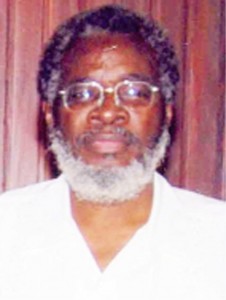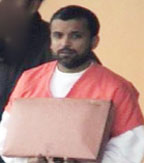– Luncheon
Even though Shaheed Roger Khan has pleaded guilty in the US to trafficking in some 150 kilos of cocaine, the Guyana government would still need conclusive evidence that criminal and other unlawful activities took place in connection with his business dealings in Guyana before an investigation could be launched.

This is according to Head of the Presidential Secretariat Dr Roger Luncheon who was asked whether the government would be investigating Khan’s business dealings with a view to seizing some of his assets.
Khan, who has been in a US prison since 2006, surprisingly threw in the towel early last month after strenuously proclaiming his innocence for years. He admitted before Judge Dora L. Irizarry that he had trafficked in some 150 kilos of cocaine from January 2001 to March 2006 and she accepted his plea. Khan also changed his not guilty pleas to charges of witness tampering and possession of a firearm by a convicted felon. He had been jointly charged with witness tampering with his former lawyer Robert Simels and his assistant Arianne Irving, both of whom are still to face trial in the matter. He is now awaiting sentencing, pending a probation report.
“It’s a difficult question to answer off the bat,” Luncheon said, when asked about an investigation into Khan’s businesses. “But I would say this [if] information is provided to the administration that conclusively shows or establishes that in his business dealings and in his activities in Guyana criminal and other unlawful activities have been taking place, prosecution would of course flow.”
Luncheon further said that the administration would not pursue any criminal procedure or proceedings in the absence of “definitive information to the effect that criminal activities and specific criminal activities have taken place…”
He said this is so “particularly because Mr Khan is incarcerated overseas and much of the information that is flowing is information that has been provided or there is a suggestion that it has been provided under oath in the US court system, that is the information that we… or the average Guyanese would be relying on to be the basis of pursuing Mr Khan [with regard to] improper and illegal activities in Guyana….”
While Khan was said to have owned several business ventures in Guyana, including a popular night club, attorney-at-law Vic Puran, who had represented him while he was in Guyana, had told Stabroek News that as far as he knew the drug trafficker had no businesses in Guyana. He had said the housing development company, Dream Works Development Inc, was a company on paper as the houses it built had already been sold to people and Khan had collected the money. So he now had no say in the housing scheme. Puran had also claimed that persons had moved to the court over money Khan owed them, but with him behind bars it was unclear how they expected to collect. He said Khan had been in financial woes for quite some time and found it difficult to even pay his lawyers in the US.

There have been many calls from sections of society for the government and the police to launch investigations into the activities of Khan while he was in Guyana. And while President Bharrat Jagdeo had said that the police ought to investigate Khan’s activities, including his alleged involvement in executions and extensive drug trafficking, no move has been made in this direction.
Following Khan’s guilty plea, Alliance For Change leader Raphael Trotman had said that there was enough evidence from the case to warrant a full-scale investigation into Khan’s involvement with the government and the unsolved murders that piled up during his activities in Guyana.
The PNCR has also maintained that it is not possible that Khan’s activities in Guyana would not have been known to senior officials of the Guyana government.
The party has reiterated its position that an “independent and impartial Commission of Inquiry must now be launched into the criminal enterprise headed by Roger Khan which was responsible for the deaths of more than 200 Guyanese.”
It had pointed out that Khan himself had publicly stated in a paid advertisement in 2006 that he worked along with a section of the security forces to curb crime and protect the government.
But President Jagdeo had dismissed the calls for investigation into government links to Khan saying that Khan had made several claims and he had never given any weight to what Khan had said in the past.
“Did you ever have contact with Roger Khan?” the President was asked days after the guilty plea and he responded “No.”
A former government minister and a serving one had been mentioned in the transcript of a conversation Robert Simels had with a US government confidential source (CS), as having met with Khan. But the President had said he knew nothing of any such meetings. It was the conversations Simels had with the CS that saw him, Irving and Khan being slapped with witness-tampering charges.
“I have said before, Khan said several things, he said that [former Commissioner of Police Winston] Felix was undermining the Government of Guyana too; he said he had taped conversations with people sharing information who are linked to drug dealers,” the Head of State had told reporters.
“I have never put any store on what Roger Khan has said in the past or not said. I never decided whether he is guilty or not guilty, so if he pleads guilty he has to face the consequences, that is clear.”
However, at a later press conference he did say that local authorities were obligated to investigate Khan’s activities in Guyana, including his alleged involvement in executions and extensive drug trafficking.
But he had emphasised that US collaboration was essential and placed the burden for seeking available evidence squarely on the shoulders of Police Commissioner Henry Greene, saying that it was his job. “If there was any criminal offence that was committed in Guyana, then we have an obligation, once we get the information to pursue that,” he had said at a press briefing at the Office of the President. “I said this before: We have an obligation, according to our laws; if people were killed here and we have information that this was so, it requires collaboration with the US government.”
The US government had said that Khan was the leader of a Georgetown-based cocaine trafficking organisation, which was backed by a “paramilitary squad that would murder, threaten, and intimidate” others at his directive. The organisation imported large quantities of cocaine into Guyana, which were then shipped to the Eastern District of New York and other places for distribution. The US government had said Khan’s enforcers committed violent acts and murders on Khan’s orders that were directly in furtherance of his drug trafficking conspiracy. The paramilitary squad was referred to as the “Phantom Squad,” which a confidential US source said was responsible for “at least 200 extra-judicial killings” in Guyana between 2002 and 2006.
Prior to fleeing to Suriname after there was an attempt to arrest him, Khan himself placed newspaper advertisements in the Guyana Chronicle and the Kaieteur News stating that he had been involved in crime fighting in Guyana and had worked closely with local and US law enforcement officials.
The now dead George Bacchus, a self-confessed informant for the group, which targeted suspected criminals for execution, claimed that its formation was in response to the upsurge in violence. The then home minister Ronald Gajraj was linked to the group by Bacchus, but was subsequently cleared of any involvement by a Presidential Commission of Inquiry.





